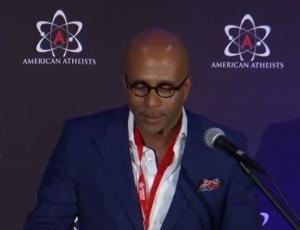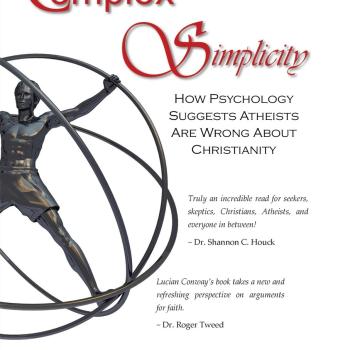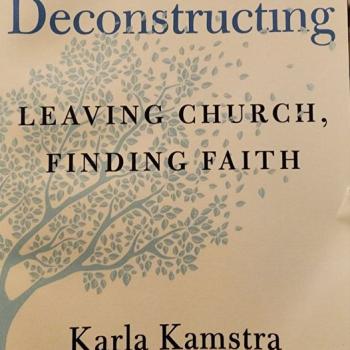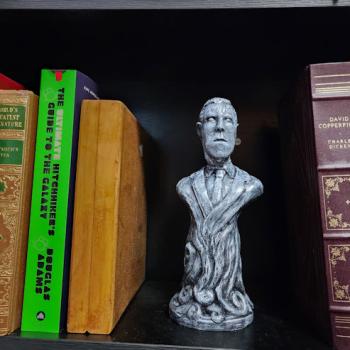
As a column that discusses the process of religious conversion and deconversion, this space will occasionally feature the stories of individuals who have either dramatically entered or exited the Christian faith. This is one such story.
While Anthony Pinn may be an academic in career, he is a poet at heart. While addressing the Ethical Humanist Society of Chicago in 2014, he made certain to let the audience know that he finds poetry to be a far more effective way of communication than academic jargon.
Pinn grew up in Buffalo New York.
Pinn’s family moved to Buffalo during an early migration of African Americans Northward following the promise of opportunities and prosperity that the north offered.
His grandparents were deeply committed Baptists, and some of his earliest memories were spending time at his grandfather’s Baptist church watching the service while creating games to keep himself occupied.
The games he and his friends played while they were supposed to be listening in church were fun, but he lived in dread of his grandfather seeing him playing and giving him a deeply judgmental look to stop the games.
Among Pinn’s retrospective criticism of the Baptist church in which he was raised is the idea that women were not allowed roles of leadership – creating an essentially oppressive environment.
This was a lesson of which his mother was keenly aware. Because of this, she and Pinn’s sister eventually began attending church with him at a small independent church with more progressive notions. While she did not insist this on her son, he wanted to do what his sister did, and he began attending with them.
The church didn’t seem nearly as uncomfortable with his childish games, which made for a more freeing environment.
It was this open environment and comfort which made Pinn excited about the church. And so, one day, after waking from a nap he was taking during the service, he noticed a large swath of the congregation migrating to the front of the church. His mother explained that these people were giving their lives to Christ, and joining the church. Pinn was excited by the opportunity, and took his place at the front to be entered into true belief and church membership.
Pinn threw himself body, mind and soul into his newfound membership – attending every activity he could as regularly as he could throughout the week.
Due to the small size of the church, Pinn’s Sunday School was taught by the church’s pastor. It was during these Sunday School sessions, that Pinn’s destiny was sealed. As the pastor went around the class one day asking the children what they wanted to be when they grew up, Pinn was somehow inspired to tell the minister that he, too, wanted to be a pastor.
At this time, Pinn was still very young, but as soon as the minister heard him express his desire to preach, he took the young man under his wing to train him for the ministry.
Anthony became apprentice to the minister; collecting offerings, lining hymns and giving prayers both privately and corporately.
For the Methodist church Pinn was attending, this was not an unusual turn of events. The general philosophy was that anyone who felt called should be given every opportunity to follow that calling where it led. The mere act of saying one wanted to minister was tantamount to being ordained.
Eventually, Pinn’s church changed denomination, becoming an African Methodist Episcopal church: the oldest Black denomination in the country. With the new denomination came a new minister, who immediately encouraged young Pinn to preach his first sermon. Pinn was, at this time, 12 years old.
Pinn’s family was encouraging and proud to see young Anthony behind the pulpit, and as a way of encouraging him, Pinn’s grandfather gifted Anthony his personal Bible, worn by care and age, so that Pinn might have something traditional with him at the pulpit.
Ever the poet at heart, Pinn’s source material for that first sermon was the classic “Sinners in the Hands of an Angry God,” wherein he spoke hellfire and damnation to the audience at large – with no feeling of condemnation to himself.
Anthony was proud to find three parishioners bowing at the alter to dedicate their lives to Christ after that very first sermon. This only encouraged the church body to think of Pinn as a consecrated minister – at the age of 12.
With no training, Pinn was immediately absorbed into the church staff, and given the assignment of youth minister.
As a teenager, Pinn’s mother placed him in a small, private Christian school run by a Baptist denomination, with the hope that this would continue to guide him in his calling. The school had ties to the old and very fundamentalist Christian University, Bob Jones.
Given his age and lack of maturity, this new identity put a tremendous amount of pressure on the young man. To add to the pressure, Anthony’s grandmother pushed him to get education and a degree to back his authority as a preacher.
While Anthony was eager to get an education, he had his sights set on a secular college. When his pastor was transferred to Brooklyn, Pinn’s mind was made up, and he followed his pastor by attending the nearby Columbia University.
While attending university, Pinn worked as an ordained minister at a nearby church in Brooklyn. Pinn was 18 years old.
It was at secular school that Pinn’s traditional notions of understanding scripture were challenged. As he encountered literary criticism, he was stunned to realize that the academic world didn’t treat the Bible significantly differently than any other ancient piece of literature.
Another shock to Anthony’s system was the contrast that appeared to him between the church community in which he had been raised, and the non-religious college community. He realized that his church community tended to be a bit more judgmental and unaccepting than the secular crowd at University.
While preaching and attending university simultaneously, Pinn began to feel his messages falling flat. That the things he had to say as a minister were unable to connect to the actual world in which his audience traveled. The Bible and the church seemed out of touch with the street-level lives of the people he saw.
This despair continued to build until, by the time he was a Junior in college, Anthony began dodging his church duties entirely.
Pinn’s idea of ministry began to change. No longer was he serious about standing in front of a congregation and speaking at them – he wanted to hit the streets and meet the needs of people at the ground level. He found a voice in protests more than in preaching.
In order to get away from the church body with which he was feeling increasingly uncomfortable, Pinn changed his sites from getting a religious degree at a seminary, and instead headed for Harvard. This location would give him breathing room from the church, and the opportunity to pursue his new idea of ministry.
While at Harvard, Pinn continued to work at a church – this time a very small one in a rough neighborhood. Pinn began to see the truth about urban life and the plight of urban communities – seeing real drug dealing and prostitution for the first time in his young life.
Still a youth pastor, Pinn was ever more aware of the fact that nothing he had to say as a minister met the needs of the neighborhoods from which these young people came.
All this was very depressing for Pinn. His minister encouraged him to try and uplift and bring joy to these otherwise downtrodden folk, but Pinn thought this was tantamount to giving distractions and false hopes instead of real solutions.
Pinn continued to alter his theology to fit the doubts and circumstances that he experienced and saw, but with continual bending, his theology eventually broke.
As Pinn saw it, he had two choices: be faithful to religion, or be faithful to the needs of the people. With just these two options in front of him, Pinn’s care for his community won over his care for his traditions, and he abandoned his faith to side, instead, with the needs of the people.
Anthony contacted his pastor and his church leaders to inform them that he was leaving the church and surrendering his ordination.
More than simply abandoning Christianity, Pinn’s soul searching led him eventually to the conclusion that theism, in general, was a problem. Pinn, instead, found comfort in poetry, literature and music.
Pinn came to the conclusion that religion was focused on good works – not on goodness of heart and being. Pinn found Humanism to the superior worldview because of its focus of the goodness – not badness – of human nature. He eventually became a Universalist – describing himself as a non-theistic Humanist. The focus of his Humanism was its relationship to the African-American culture and community.
Anthony Pinn is now a professor of religious studies at Rice University and has a Ph.D. in religious studies from Harvard and a professorship in Houston. Added to his academic duties: he speaks at atheist and skeptic conventions, humanist conventions, and debates on the subject of religion and the African-American community.
Pinn’s final thoughts on religion are these: “I think African Americans are worse off because of their allegiance to theism. The belief in God and gods has not been particularly useful or productive for them. It has lessened their appeal to their own creativity and ingenuity, and in most cases has resulted in a kind of bizarre understanding of suffering as a marker of closeness to God and a mark of divine favor. Nothing good can come out of that.”













